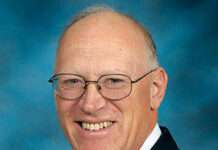This year, 2021, is the national year of the sunflower. That’s nice recognition, especially because the pretty, golden sunflower is the state flower of Kansas. In one rural community, this has served as inspiration for a beautification initiative. Coincidentally, this is also a year when that community is working to save its historic theater downtown. The building is named – what else? – the Sunflower Theatre.
Last week, we met Dr. Susan Mayo, who is part of the effort to save the historic Sunflower Theatre in downtown Peabody. Among the others joining in that effort is Marilyn Jones, who has also taken on a project of community beautification.
Marilyn is originally from the rural community of Dexter, population 278 people. Now, that’s rural. After attending Oklahoma State University, she and her husband, Gary, came to Peabody in 1961. That’s where Gary began a long-time career as an ag teacher. Their son, Mike, and daughter, Lynn, earned degrees from Kansas State University. Marilyn operated a greenhouse business in the area for some 55 years before retiring.
“We have a big garden, and I’m now raising plants for my own pleasure,” Marilyn said. She’s even raising distinctive red Tunis sheep. She is also deeply involved in the community, including the effort to save a piece of local history.
“The Sunflower Theatre was built in 1920,” Marilyn said. “It had beautiful tile and a terra cotta sunflower design on the ceiling.” Originally, the facility played host to vaudeville shows and then was converted to a movie theater. Eventually it was remade into a bowling alley but has been closed for about 12 years. “When we moved here, there was a nice jewelry store in the front,” Marilyn said.
A nonprofit foundation has been formed with a goal of saving and restoring the building. “Fortunately, the building got a new roof five years ago,” Susan said. “In 2019, we did a major cleanup inside the building.” The group is now seeking grants to support the major work of restoring the old theater.
“Our high school has no stage,” Marilyn said. “When they do concerts, they have to do them in the gym. The theater would be a great place for them to do their performing arts.” Ideally, the theater could host classes in visual art, music and dance. There is also space for offices, classrooms or an upstairs apartment.
The Sunflower Theatre Foundation has already hosted several events in the building. A kickoff concert featured professional musicians and the high school choir. Then COVID-19 hit. “We had a COVID-safe opening in July,” Susan said. “Even with COVID, we had events at Halloween and Christmas.”
Marilyn added, “We had an excellent art show including some 40 local and regional artists. There were nice photographs, oil paintings, and weavings.”
Meanwhile, Marilyn noticed that the National Garden Bureau had proclaimed 2021 as the national year of the sunflower. One day, she was driving to Hesston, and a beautiful sunflower field caught her eye. She tracked down the owner, a local man named Jim Graber.
Mr. Graber was selling high-value seeds for cover crops but, in a bin, he had some sunflower seeds which he donated to Marilyn. She and a couple of other volunteers gathered up leftover mineral tubs from local farmers to recycle as a type of planter. Then Marilyn and friends donated sunflower seeds and planters to the public. The goal is to clean up and beautify the region.
“We set up for a couple of Saturdays downtown and gave sunflower seeds away,” Marilyn said. Ninety-five tubs have been given away. Meanwhile, sunflower seeds are still being donated.
“People could plant sunflowers in the containers or plant anything they want,” Marilyn said. “There are lots of varieties of sunflowers, from 14 inches tall to 14 feet tall.”
In this national year of the sunflower, we commend Marilyn Jones and the other volunteers who are making a difference by beautifying their community and working to save the historic Sunflower Theatre. Marilyn is using her green thumb to promote golden sunflowers.
Audio and text files of Kansas Profiles are available at http://www.kansasprofile.com. For more information about the Huck Boyd Institute, interested persons can visit http://www.huckboydinstitute.org.
The mission of the Huck Boyd National Institute for Rural Development is to enhance rural development by helping rural people help themselves. The Kansas Profile radio series and columns are produced with assistance from the K-State Research and Extension Department of Communications News Media Services unit. A photo of Ron Wilson is available at http://www.ksre.ksu.edu/news/sty/RonWilson.htm. Audio and text files of Kansas Profiles are available at http://www.kansasprofile.com. For more information about the Huck Boyd Institute, interested persons can visit http://www.huckboydinstitute.org.
K State Research and Extension is a short name for the Kansas State University Agricultural Experiment Station and Cooperative Extension Service, a program designed to generate and distribute useful knowledge for the well being of Kansans. Supported by county, state, federal and private funds, the program has county extension offices, experiment fields, area extension offices and regional research centers statewide. Its headquarters is on the K State campus in Manhattan. For more information, visit www.ksre.ksu.edu
Column by:
Ron Wilson
[email protected]
785-532-7690





